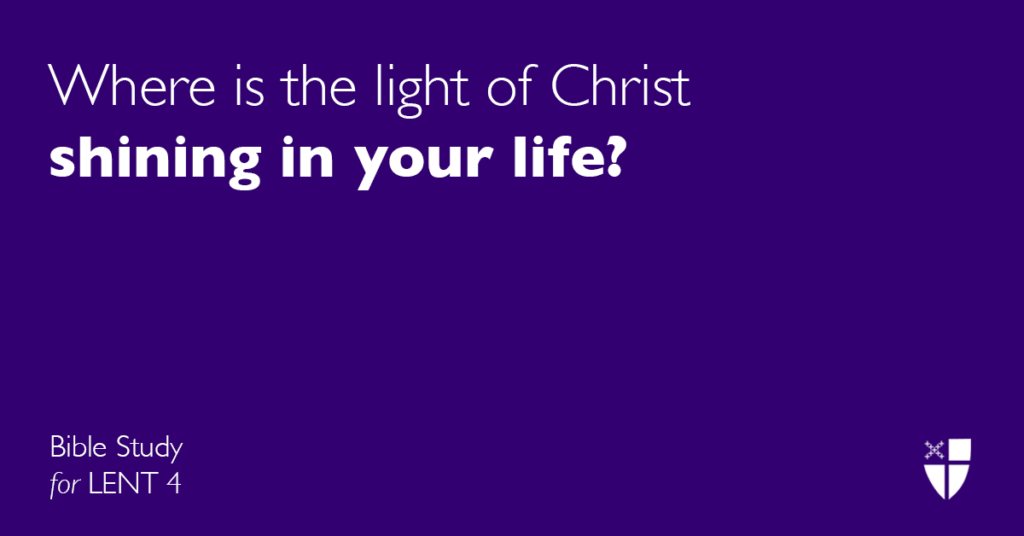This page is available in: Español
Bible Study: Lent 4 (B) – 2021
March 14, 2021

RCL: Numbers 21:4-9; Psalm 107:1-3, 17-22; Ephesians 2:1-10; John 3:14-21
Numbers 21:4-9
The wilderness accounts of the Exodus are filled with honest narratives of the Israelites complaining to Moses because they are wandering around, discontent, scared, or even worried they have made the wrong decision. In this story, it seems the Israelites are a bit hangry! Despite being saved from a life in captivity, they are unhappy with the quantity and quality of their food and want to make sure not only Moses, but God knows this as well. God’s response may seem unlikely—God sends snakes that kill—but the response reminds the Israelites that God has not abandoned them. Instead, they must trust in God to ensure they live. The Israelites realize their error and God reverses the punishment by using the same animal, now as a statue, to bring life out of death for the Israelites.
- As humans, we may become restless and even become complainers or blamers. Have you ever complained to or blamed God? How did it feel?
- Where is your wilderness?
Psalm 107:1-3, 17-22
Like the complainers in the reading from Numbers, the “fools” of Psalm 107 are also redeemed by God. The Psalm and reading illustrate the love and desire God has for a relationship with God’s people. Spanning all directions of the land, the Psalmist illustrates the reality that no complaining, rebellion, or wandering can separate the people from God’s desire for them. God’s mercy and love even saved the people from death. The Psalm varies from the Numbers reading and the Gospel because it begins and concludes with the responsibility of the redeemed children not only to offer their appreciation of God’s mercy but also to share God’s wondrous acts with the rest of the world.
- How do you respond to God’s mercy in your life?
Ephesians 2:1-10
We have been given a gift, and while we may think about this more in Advent and Christmastide, the reality is we live with and benefit from this gift every second of our lives. God’s gift of love in the Incarnation and Resurrection brought us out of our sins and into the new redeemed life. And as the letter to the Ephesians says, Jesus’ divinity and joining with humanity allows us, as children of God, to share in his divinity and have an eternal place with God. The letter further emphasizes the power in God for the redemption of creation. God has created us, called us good, and, through Christ, has allowed us to live into our new redeemed life. For the Ephesians, the beauty of this reality is in the union of community it suggests—we are “alive together” in Christ.
- What does it mean to share in the divinity of Christ?
- What gift is God giving you today?
John 3:14-21
The Gospel reading shares the last part of a conversation with a Pharisee, Nicodemus. Just a few verses earlier, Nicodemus arrived in the darkness of the night to question the divinity of Jesus and to understand Jesus’ relationship to God. Through his monologue, Jesus is bringing Nicodemus out of his confusion and darkness into the light that is seeing God in Christ. We don’t hear about Nicodemus in our reading because Christ’s light has overtaken the scene, and just like the serpent in the allusion to the Numbers reading, the light of Christ brings new life through death. A death, because God’s love and desire for the world is so immense, that God joined humanity by sending the Son so that the world might come to know God through Christ. We have been redeemed and given a new life in Christ and through this our lives have been forever enlightened. This is the crux of our Christian identity.
- John 3:16 has become almost the slogan of the Christian faith, but what does it mean to you? How do you understand eternal life in Christ?
- Where is the light of Christ shining in your life?
This page is available in: Español
Don’t forget to subscribe to the Sermons That Work podcast to hear this sermon and more on your favorite podcasting app! Recordings are released the Thursday before each liturgical date.
Receive Free Weekly Sermons That Work Resources!
This page is available in: Español


